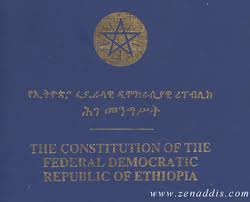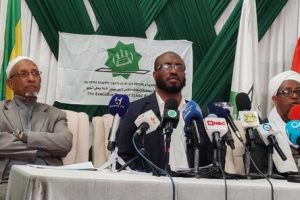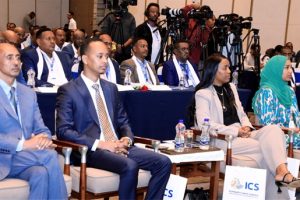
Since its ratification, the FDRE Constitution has been at the center of debate in relations to some articles, now that freedom of speech and political rights started to gain more grounds, the polarized outlook towards the supreme law has reached fever pitch in controversy that spans more than two decades.
The major controversies include issues on ethnic federalism, right to self determination—the right to self determination up to secession, Art.39 (1) and others. But these issues have come to the spotlight of political debate once again with great intensity sparking need for national dialogue on the Constitution.
On the other hand, for some, the Constitution has brought success in ensuring self rule and equality of Nations and Nationalities and Peoples (NNP), recognition of religious and linguistic diversity as well as human and political rights.
In his recent dialogue with over 80 political parties of the country, Prime Minister Dr. Abiy Ahmed says that every aspect of the country’s laws is open for discussion and further scrutiny including the Constitution stressing the need for holding public consultation to decide on the matter.
Dr. Mesenbet Assefa, Law Asst. Prof. at Addis Ababa University, argues that the unconditional rights to self determination of NNP are okay but the issue of secession is one of the most controversial parts of the Constitution.
It is fair to say that there seems to be contradiction between the history of the country which is largely built on strong commitment towards state unity, sovereignty and independence and the right to secession. “The article has presented real danger to the peaceful coexistence of the people.”
“It is my personal opinion that the article 39 should be revised. We have seen very dangerous use of it in recent Ethiopian Somali state by the politicalclique. In fact, pro democracy forces should not see secession as the only viable option to peace and stability.”
The right to secession may appear to be counter productive towards peace and stability of the country as it may run against the essence of Constitution, which is manifestation of identity. Secession is barley Constitutional right in other countries; Ethiopia is one of the three countries that guarantee secession as a Constitutional right, he adds.
Also, ethnicity defines every political power in the country. Even if federal system is efficient form of government, the fact that it is hyper ethicized and its [ethnic identity] competitive nature of the Ethiopian identity risks cooperation and unity which are fundamental characteristics of the system of governance, he argues.
There has to be further consultations and discussions as to how to democratize and improve the federal system in a way it could strengthen national unity, he stresses.
The ideals of ethnicity have been distorted and the ideals of citizenship have significantly been undermined with political rights or equality of citizens less addressed. ‘’We need to move on to more realistic Constitutionalism, therefore.”
The Constitution has also progressive aspects. One cannot rule out the fundamental rights the legislation guaranteed. It has recognized basic human and political rights that align to universal human right conventions, he adds.
Girmay Halefom, Lecturer at Axum University Department of History and Anthropology, prefers to differ with the argument above.
He says that the right to self determination up to secession guarantees NNP of the country to decide upon their destiny.
The major concern should be protecting and fulfilling their political, economic and social rights. “If so, I believe, nobody wants to secede.”
The issue should not be the provision of secession as a right, because it is an unavoidable in absence of people’s right. The Constitution is relevant in that it contains other important rights such as the rights to use mother tongue and freedom of expression and develop one’s own culture, Girmay notes.
Dr. Fasil Nahom is member of the Constitutional Council of Inquiry.
Mentioning the fact that the Constitution came to effect over a quarter of a century ago, he says the younger population today may not have clear understanding about the procedures followed during the drafting stage. But anybody who contemplated the process during the time can remember that the adoption of the Constitution had been preceded by proper consultations of various segments of the society, he argues.
It was probably not possible to reach every corner of the country. However, the Transitional Government tried to reach 20,000 Kebeles (administrative units at grassroots), he states.
In addition, Dr. Fasil says there had been series of discussions on the media.
Constitution can be amended at certain times. The bigger vision and essence of the Constitution may not change but there are aspects of the Constitution that need improvement or revision. In fact, the legislation is open to debates and amendments, he adds.
The long-standing controversies over the Constitution include system of governance whether the country should stick to federal state structure or not; whether the federal system should be geographic or based on settlement patterns, culture and language, identity or not. These have long been major sources of intense debate. Land ownership has been at the center of political debate whether it should be public or private property, he explains.
“I am against the complete dismantling of the Constitution, It is only waste of time but the major controversial aspects of it should be selected and reexamined. Further scrutiny is inevitable.”
As to the growing issues of identity and boundary, the Constitution can address and has also addressed the question of identity, he believes.
It also recognizes and gives jurisdiction to the branch of government such as the House of Federation to deal and look into such matters, he says.
In fact, the house of federation that primarily deals with the issues of identity and boundaries should qualify and equip itself with necessary professionals and procedures to resolve issues under its jurisdiction. It should reexamine itself to live up to the standards to pass an independent a genuine verdict to the question of identity, according to him.
“Constitution can always be amended that is at least what US history shows to us.”
The fact that the Constitution overruns citizens’ rights is an absolute wrong. Both the right of individuals and groups are very much recognized and addresses, he says, adding human rights are guaranteed based on universal human right convention.
“Much of the problems with regard to human rights lies on the interpretation and implementation of the law.”s
This is not to mean that the Constitution has not brought fundamental success in the country. Peace and stability have been relatively ensured since the stipulation of the Constitution. The expansion of education, health and growing economic development are mainly attributed to the outcome of the Constitution, he argues.
While all come up with their own insights regarding the controversies, revolving around the supreme law of the country, all agree that this time calls for further scrutiny of the Constitution to create national consensus by either revising or upholding it.
Herald December 8/2018
BY DESTA GEBEREHIWOT






As constitutional debates intensify, the quest for consensus demands scrutiny. Disagreements over governance, rights, and amendments fuel tensions, challenging unity. Transparency, dialogue, and legal clarity are crucial to bridging divides. Without careful examination, rushed decisions risk deepening discord rather than fostering a stable, inclusive constitutional framework for the future.